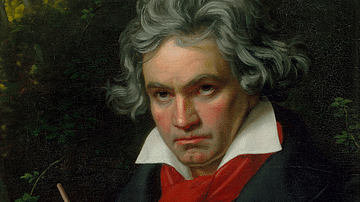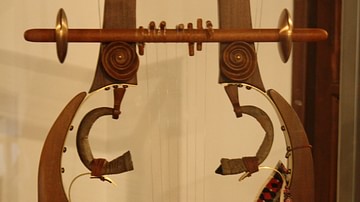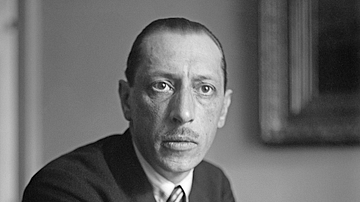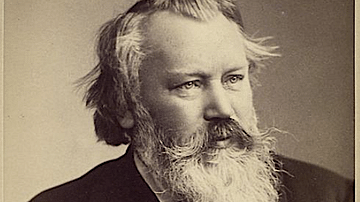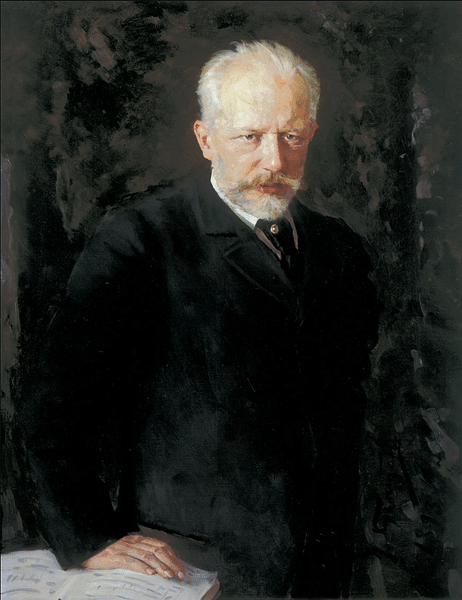
Pyotr Ilyich Tchaikovsky (1840-1893) was a Russian composer most famous for his symphonies, the ballets Swan Lake, The Sleeping Beauty, and The Nutcracker, and the operas Eugene Onegin and The Queen of Spades. A composer of innovative and uniquely Russian music with a high sense of melody, Tchaikovsky's work remains among the most popular of any of the great composers.
Early Life
Pyotr Ilyich Tchaikovsky was born in Kamsko-Votkinsk, near the Ural Mountains in western Russia on 7 May 1840. His father was Ilya Petrovich, a mining engineer who managed the local ironworks. The family moved to St. Petersburg in 1850. Pyotr Ilyich was enrolled in a college to train to join the civil service, but he did take private piano lessons. He had an elder brother, Nicholas, a younger sister, Sasha, and, in 1850, two younger brothers, the twins Anatoly and Modest.
In 1854, Pyotr Ilyich's mother died of cholera. Graduating in 1859 from the School of Jurisprudence, Tchaikovsky joined the civil service as a clerk in the Ministry of Justice but was not content to stay there. In 1862, he joined the St. Petersburg Conservatory, which had just opened, where he studied composition under Anton Rubinstein (1829-1894). Within four years, he graduated and became a teacher of harmony at the Moscow Conservatory. Again, this conservatory was brand new, and Tchaikovsky secured the position thanks to the patronage of Anton's brother Nikolai Rubinstein (1835-1881), the celebrated pianist and composer. Tchaikovsky held his teaching post until 1878, during which time he wrote several textbooks on harmony. After 1878, Tchaikovsky concentrated on composing.
Tchaikovsky's composing career began with the public performance of an overture in March 1866. The piece was part of the score for the play Groza (The Storm) by Ostrovsky. By 1868, his first symphony, titled Winter Daydreams, was performed with Rubinstein conducting (Tchaikovsky composed it back in 1866 and revised it in 1874). In February 1869, Tchaikovsky's first opera, Voyevoda (Dream on the Volga), was staged at Moscow's Bolshoi Theatre. It was not a success – Tchaikovsky even destroyed the score – and neither was his second opera Oprichnik (The Life Guardsman). The composer's symphonic poem of 1869, Romeo and Juliet, based on William Shakespeare's play was a success. Tchaikovsky, as he did so often with his work, revised Romeo and Juliet in 1870 and again in 1880.
Mature Work
In May 1872, Tchaikovsky wrote his Second Symphony, which became known by the title Little Russian. Like his First Symphony, it employed folk tunes, this time not from Russia but Ukraine. Tchaikovsky had composed the symphony while staying on the estate of his sister's husband near Kamenka in Ukraine. The symphony achieved acclaim when first performed in 1873. In this period, Tchaikovsky was also working as a music critic for the Russkiye vedomosti newspaper. In 1874, he wrote his First Piano Concerto which was performed with success in Boston in 1875, with the orchestra conducted by Hans von Bülow.
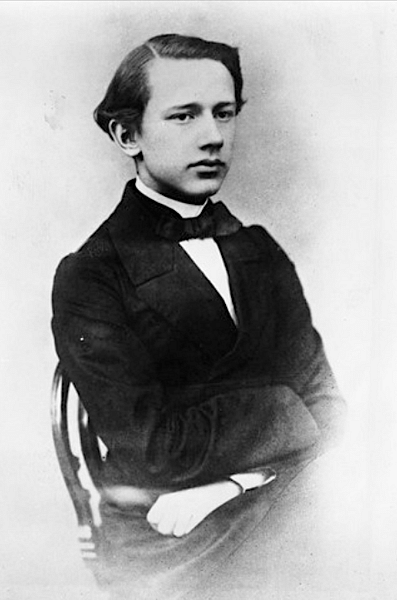
Tchaikovsky greatly admired the music that had been composed before him, notably the work of Wolfgang Amadeus Mozart (1756-1791). Tchaikovsky was especially interested in opera, and he travelled across Europe to see such works as Ring by Richard Wagner (1813-1883) and Carmen by Georges Bizet (1838-1875). He also admired the ballets of Léo Delibes (1836-1891), who gave the musical scores of ballet much more importance than previously. Returning to Russia, Tchaikovsky composed the symphonic poem Francesca da Rimini, based on an episode from the Divine Comedy by Dante Alighieri (1265-1321), and the Variations on a Rococo Theme for cello and orchestra in 1876. In 1878, he completed his Violin Concerto, which had been written in Switzerland.
For the first performance of his rousing 1812 Overture (1880), which was inspired by the Russian victory against Napoleon's army in the retreat from Moscow, Tchaikovsky incorporates an innovative use of bells. In the piece's finale, the bells of Uspensky Cathedral were used (the composer's request to simultaneously use Moscow's other church bells had been turned down). The work has an evergreen popularity, even if Tchaikovsky described it as "loud and noisy…and probably artistically worthless" (Thompson, 135). By the mid-1880s, Tchaikovsky was a national hero. In 1888, he wrote his Fifth Symphony. In 1891, the composer successfully toured the United States. Tchaikovsky's symphonies, ballets, and operas ensured his place in the pantheon of great composers.
Character & Relationships
Tchaikovsky was "a moody, melancholy character, prone to fits of depression, but also of heightened optimism" (Thompson, 132). He was nervous, shy, and something of a hypochondriac. He was homosexual, and he had several affairs and casual liaisons with young men, but the society in which he lived required him to keep this secret. He became engaged (or at least wrote to his father that he was) to the singer Desirée Artôt, but her family did not approve, and the relationship, whatever it really was, ended abruptly.
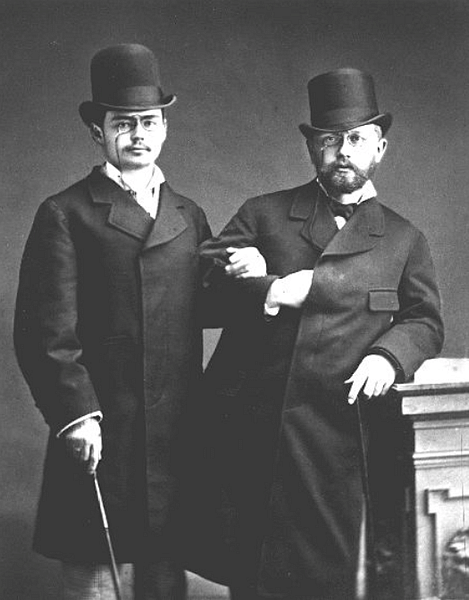
Perhaps in another misguided reaction to living a secret life and searching for some sort of 'respectability' to abate unwanted rumours (the composer admits as much in a private letter), in July 1877, the composer married Antonina Ivanovna Milyukova. She was a music student who had become infatuated with Tchaikovsky – she had even threatened suicide if he continued to reject her. A combination of Antonina suffering mental health problems (she was committed to an asylum in 1896) and Tchaikovsky's homosexuality meant, inevitably, that the marriage was doomed. Tchaikovsky regretted his moment of madness and even described his wife as "absolutely repugnant" (Arnold, 1807). They separated after a few weeks, the composer giving her a lump sum and then a regular allowance.
Tchaikovsky struggled with his sexuality both before and after the marriage, and there were several suicide attempts, notably immediately after his separation from Antonina when he tried to drown himself in the freezing waters of the Moskva River. That the attempt was genuine is indicated by the fact that Tchaikovsky wrote on the score of his just-completed Fourth Symphony: "In the event of my death. Deliver to Madame von Meck" (Steen, 676).
From around 1873, Tchaikovsky began an odd relationship with Nadezhda von Meck. She was the widow of a railway tycoon and immensely rich. Since she adored his music, she gave Tchaikovsky money as well as lucrative commissions, but her condition for this assistance was that they should never meet, even when the composer stayed on the widow's vast estate in Brailov in Ukraine and she was also in residence. The pair did unintentionally meet a handful of times at concerts, and once by chance while out walking, but they never spoke to each other on these occasions. The pair corresponded frequently, and the letters are a valuable insight into how Tchaikovsky worked. The composer's Fourth Symphony was dedicated to Madame von Meck. This odd millionaire-artist relationship survived until 1890.
After his failed marriage in 1877, Tchaikovsky continued his relationships with younger men, notably the violinist Iosif Kotek, a protégé of Madame von Meck. Professionally, Tchaikovsky seems to have now become preoccupied with the idea of fate, a theme in both of his operas, Eugene Onegin and the later The Queen of Spades. Increasingly melancholic in his view on life, the composer once said that he had become preoccupied with "regretting the past and hoping for the future, never being satisfied with the present" (Arnold, 1805). Thanks to funds from von Meck, from 1878, the composer lived in Maidanovo (where he financially supported the local school), around 96kilometres (60 mi) from Moscow, and then nearby Frolovskoe, and then, from 1884, in a large country house (dacha) in nearby Klin. The sudden break in his letter-only relationship with von Meck in 1890 depressed the composer. Unknown to him, von Meck feared bankruptcy and had become mentally unstable. Tchaikovsky was no longer dependent on her generosity, but he remarked in a letter that it was the loss of her interest in his music that really stung.

Tchaikovsky's low feelings were expressed in his Sixth Symphony, also titled 'Pathétique' (Pateticheskaya), which premiered in October 1893 in St. Petersburg, with Tchaikovsky conducting. Despite the sadness, Tchaikovsky wrote of the work in a letter, writing, "[I am] so proud, so happy in the knowledge that I really have written something good" (Sadie, 307). The symphony, the composer's last great work, is innovative with the 5/4 time signature common to Russian folk music in the second movement, the rousing march of the third movement, and the finale with its gentle adagio ending, where every other symphony composed before then finished with an allegro crash, bang, wallop. The meaning of the Sixth Symphony is obscure, deliberately so, for the composer wrote in a letter: "a programme that shall remain an enigma for everybody. Let them puzzle their heads over it" (Schonberg, 426). And puzzle they did, with theories on the work's message ranging from a tragedy of a closet homosexual to the composer's own requiem.
Musical Style
Tchaikovsky was influenced by the symphonies of Felix Mendelssohn (1809-1847), and he once described the effect of the music of Mozart on him: "[it] captivates, delights, and warms me" (Arnold, 1806). Like all Russian composers of the period, Tchaikovsky admired the work of his compatriot Mikhail Glinka (1804-1857). But Tchaikovsky's style and innovations are entirely his own.
Tchaikovsky expertly blended Western symphonic music with idioms from Russian folklore and music. He explained: "As far as the Russian element in my music is concerned, this is because I grew up in the provinces, imbued from earliest childhood with the indescribable beauty of the characteristic features of Russian folk music" (Thompson, 132). Folk themes can be heard, for example, in Tchaikovsky's Violin Concerto but also, as we have seen, in unusual places like his symphonies.
The music historian C. Schonberg is of the opinion that Tchaikovsky's greatest attribute and distinguishing feature regarding his contemporaries was his sense of melody:
It was this melody that was to make him famous, first in Russia, then internationally. It was a peculiarly Russian kind of melody, plangent, introspective, often modal-sounding, touched with neuroticism, as emotional as a scream from a window on a dark night. The music reflected the man.
(414)
Tchaikovsky may have looked abroad for literary inspiration for his ballets, but for his great operas, he turned to home and the work of the great Russian poet Alexander Pushkin (1799-1837). For his stage productions, as with his other compositions, Tchaikovsky employed "a style that owed little to any composer" (Schonberg, 424).
The Great Ballets
Swan Lake
Tchaikovsky's four-act ballet Swan Lake (Lebedinoya ozero) was first staged in 1877 at the Imperial Ballet in Moscow. The libretto is by V. Begichev and V. Helster, with choreography by Reisinger. Surprisingly, considering its status today, the first production of Swan Lake was a flop. The costumes were cannibalised from other productions, the choreography was poor, and the orchestra was insufficiently familiar with the score. Tchaikovsky would never witness another production of his ballet, only after his death did it become one of the standards of the genre.
The Sleeping Beauty
In 1889, Tchaikovsky completed his second great ballet, The Sleeping Beauty (Spyashchaya krasavitsa). It was premiered at the Mariinsky Theatre in St. Petersburg. The ballet is composed of a prologue and three acts, with the libretto by Marius Petipa and Ivan Vsevolozhsky based on La belle au bois dormant by Charles Perrault (1628-1703). Petipa also provided the choreography. The ballet was first performed in 1890 in St. Petersburg. It was a success, although the Tsar's rather bland comment that it was "very nice" left the composer miffed. The final act of the ballet became so popular that it is often performed alone under the title Aurora's Wedding.
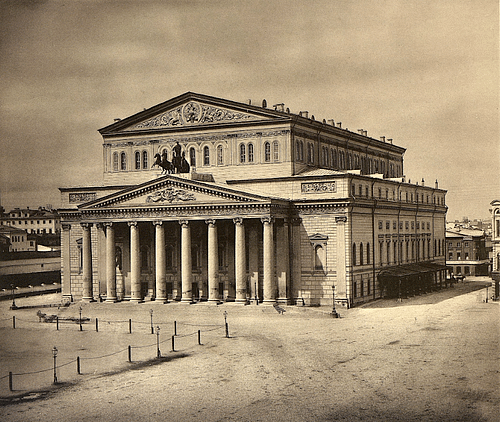
The Nutcracker
Tchaikovsky's third great ballet was The Nutcracker (Shchelkunchik), staged in 1891. It has two acts and three scenes, with the libretto by Petipa based on an adaptation of Hoffmann's Der Nussknacker und der Maüsekönig (The Nutcracker and the King of the Mice) by Alexander Dumas père (1802-1870). The original choreography was by Ivanov. The ballet was again premiered at the Mariinsky Theatre in 1892. The music was especially popular with several unusual elements, for example, the composer uses a celesta (a hybrid piano-glockenspiel) to represent the Sugar-plum Fairy. Tchaikovsky adapted the score to an orchestral suite in 1892.
The Operas
Eugene Onegin
Tchaikovsky's three-act opera Eugene Onegin (Yevgény Onégin) is based on the 1831 verse novel by Pushkin of the same name. The composer gave the opera the subtitle Lyric Scenes after Pushkin. The libretto is by Tchaikovsky and Konstantin Shilovsky. The story, with early 19th-century Russian rural life as its setting, tells of Onegin, who does not realise the value of the love given to him by the girl Tatyana. Onegin manages to involve himself in a duel with fatal consequences. He then leaves St. Petersburg but returns after six years when he sees Tatyana at a ball. Onegin realizes he loves Tatyana, but she has in the meantime married Prince Gremin, to whom she remains faithful. Onegin must leave the stage with his dreams unfulfilled. In a startling example of life imitating fiction (or vice-versa), the opera was written at exactly the same time the composer was having his own Onegin-Tatyana-style relationship with Antonina Milyukova.
The opera was innovative as Tchaikovsky, influenced by Bizet's Carmen, sought to portray "ordinary simple universal sensations far removed from high tragedy and theatricality" (Sadie, 306). The opera was first performed in private at the Maly Theatre in Moscow in March 1879 and then in public at the Bolshoi Theatre on 23 January 1881. Eugene Onegin has today become one of the most popular operas in the entire repertory of that genre.
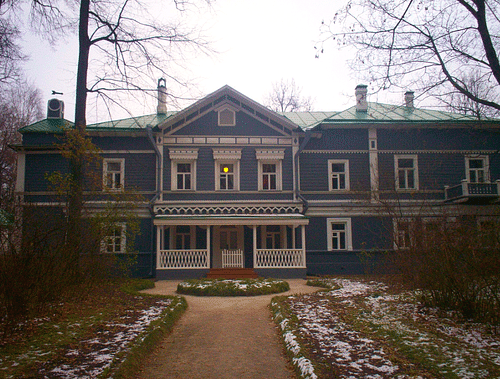
The Queen of Spades
The Queen of Spades (Pikovaya dama) is a three-act opera, with the libretto by Tchaikovsky and his younger brother Modest Tchaikovsky (1850-1916), based on an 1834 story by Pushkin. The less-than-cheery plot sees the young officer Hermann fall in love with Lisa, the granddaughter of a countess. The aged Countess was once known for her gambling past (hence her nickname, 'the Queen of Spades'), and she is said to possess the secret of how to always win at cards. Intrigued, Hermann tries to obtain the secret from the countess, but, startled in her room, she dies. The ghost of the countess appears to reveal to Hermann her gambling secret. Hermann then becomes obsessed with playing cards and so neglects Lisa, who drowns herself in despair. It turns out the Countess has tricked Hermann, and so he loses everything on the cards and then goes mad and kills himself. The opera received its premiere in December 1890 at the Mariinsky Theatre.
Tchaikovsky's Most Famous Works
The most famous works by Pyotr Illych Tchaikovsky, with first performance dates noted in brackets, include:
6 Symphonies
Romeo and Juliet symphonic poem (1869)
Piano Concerto No. 1 (1874)
Francesca da Rimini symphonic poem (1876)
Swan Lake (Lebedinoye ozero) ballet (1877)
Violin Concerto (1878)
Eugene Onegin (Yevgény Onégin) opera (1879)
1812 Overture (1880)
Manfred Symphony orchestral work (1885)
The Sleeping Beauty (Spyashchaya krasavitsa) ballet (1890)
The Queen of Spades (Pikovaya dama) opera (1890)
The Nutcracker (Shchelkunchik) ballet (1892)
Although Tchaikovsky's work was often shown in major theatres and concert halls across Europe and the United States in his own lifetime, some of his music has not always been unanimously acclaimed. As we have seen, his ballets struggled to win over their first audiences. The operas Orleanskaya deva (The Maid of Orleans, 1881) and Charodeyka (The Sorceress, 1887), like his first two operas, were not at all popular. In addition, the composer's one-time supporter Mily Balakirev (1837-1910) was a vocal critic of Tchaikovsky's work. Even his mentor Nikolay Rubinstein rejected Tchaikovsky's First Piano Concerto as "worthless and unplayable" (Thompson, 133). Some critics see too much use of melody and too little form in the symphonies.
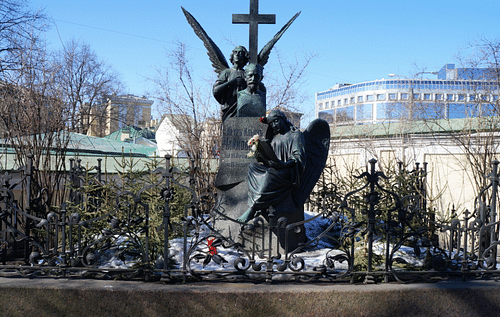
Nevertheless, Tchaikovsky remains tremendously popular with the public. His ballets continue to be the heart of the world ballet repertory. Tchaikovsky was also important in the development of music and "for his innovations in the spheres of the symphony, opera and ballet music, which he raised to a whole new level" (Sadie, 304).
Tchaikovsky's Mysterious Death
Pyotr Ilyich Tchaikovsky died in St. Petersburg on 28 October 1893. This was only a few weeks after he had completed his Sixth Symphony. The precise cause of death is not known. It may have been cholera that killed the composer, caught from drinking contaminated water, or perhaps even suicide by taking arsenic or deliberately drinking bad water. The arsenic solution seems most likely since Tchaikovsky's corpse and apartment were not quarantined by the authorities, which they would have been in a case of cholera. The motive for the suicide may have been the threat of public exposure of the composer's relationship with another male public figure, possibly even a member of the imperial family, but this theory has little support from Russian scholars. As with other untimely deaths of great artists, perhaps the speculation over the cause of Tchaikovsky's demise is a reflection of the profound admiration for the artistic legacy he left for posterity. The national hero was given a state funeral service in St. Petersburg and buried in the city's Alexander Nevsky cemetery.

